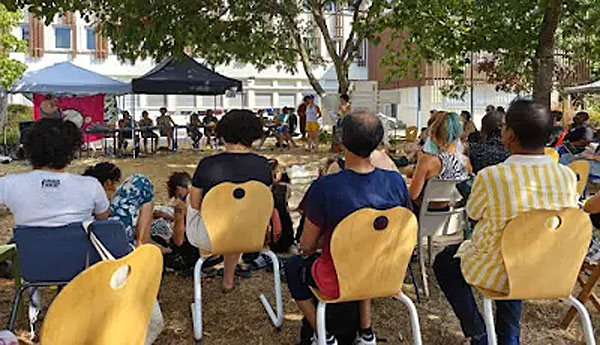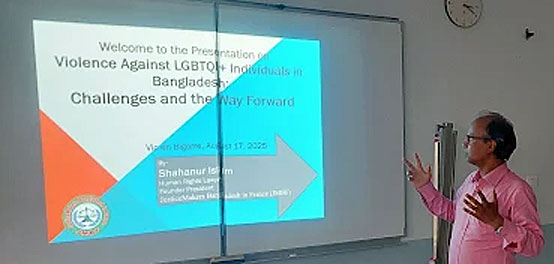In Bangladesh, anti-gay intimidation, violence and persecution are escalating
‘No protection and no recourse to justice’ for LGBTQI+ people in Bangladesh

“In Bangladesh, LGBTQI+ people have long been marginalized, but under the interim government [which took power in August 2024], the situation has reached a new level of crisis. Cases of intimidation, violence, and persecution are escalating, leaving people with no protection and no recourse to justice.”
That was the message presented last month to a feminist LGBTQIA+ rights gathering by attorney Shahanur Islam, founder and president of the human rights organization JusticeMakers Bangladesh in France (JMBF).
His colleague, JMBF Secretary General Mohammad Alamgir, added, “Bangladesh lacks any legal safeguards for LGBTQI+ individuals. On the contrary, outdated colonial-era laws are still used to criminalize their existence. Without recognition and protection, our community is left vulnerable to discrimination, harassment by state forces, and even mob violence. International cooperation and pressure are urgently needed to ensure that their basic human rights are respected.”
That plea came during the annual Euro-Mediterranean Summer Universities of Homosexualities (UEEH), a human rights gathering that has been held annually since 1979.
JMBF issued the following statement about its officers’ presentation at the UEEH:

JMBF Leaders Raise Alarming Concerns over Violence against LGBTQI+ People in Bangladesh at International Conference in France
Paris, France; August 22, 2025: Advocate Shahanur Islam, Founder President of JusticeMakers Bangladesh in France (JMBF), and Advocate Mohammad Alamgir, Secretary General of JMBF, joined the 2025 Euro-Mediterranean Summer Universities of Homosexualities (UEEH), held from August 10 to 21, 2025, in Vic-en-Bigorre, France.
UEEH, first launched in 1979, is one of the world’s longest-standing international initiatives created entirely by and for LGBTQIA+ communities. Unlike conventional conferences, it functions as a self-organized grassroots gathering, where participants live and work together in a setting rooted in solidarity, inclusivity, and mutual respect. Over the years, it has become a vital platform for knowledge exchange, activism, and community building across Europe, the Mediterranean, and beyond.
Hundreds of activists, artists, educators, researchers, and community leaders
This year’s summer university brought together hundreds of activists, artists, educators, researchers, and community leaders from around the world for 11 days of training, dialogue, and cultural exchange.
On August 17, 2025, JusticeMakers Bangladesh in France (JMBF) hosted a special workshop entitled “Escalating Violence against LGBTQI+ People in Bangladesh: Challenges and the Way Forward.” The session, led by Advocates Shahanur Islam and Mohammad Alamgir, shed light on the deteriorating human rights situation for LGBTQI+ people in Bangladesh.
Growing trends of harassment, violence, and persecution
The workshop detailed growing trends of harassment, violence, and persecution, including arbitrary arrests, threats, social ostracization, and attacks carried out with impunity. According to the JMBF leaders, the situation has worsened in recent months, following the collapse of the previous government and the rise of the present interim administration.
Advocate Shahanur Islam emphasized the urgency of the issue, stating, “In Bangladesh, LGBTQI+ people have long been marginalized, but under the interim government, the situation has reached a new level of crisis. Cases of intimidation, violence, and persecution are escalating, leaving people with no protection and no recourse to justice. We are here at UEEH to raise our voices and to build international solidarity, because silence would mean complicity.”
Advocate Mohammad Alamgir highlighted the structural challenges, saying, “Bangladesh lacks any legal safeguards for LGBTQI+ individuals. On the contrary, outdated colonial-era laws are still used to criminalize their existence. Without recognition and protection, our community is left vulnerable to discrimination, harassment by state forces, and even mob violence. International cooperation and pressure are urgently needed to ensure that their basic human rights are respected.”
Sharing strategies for advocacy
The session sparked deep discussions among participants from various countries, who shared strategies for advocacy, coalition-building, and grassroots mobilization. Many underlined the importance of transnational solidarity in pressuring governments and supporting communities living under hostile regimes.
The workshop also explored ways to create safe spaces, educational initiatives, and support networks for LGBTQI+ people in Bangladesh, despite legal and political restrictions.
UEEH is widely recognized as more than just a summer camp. Described by participants as a “laboratory of ideas and practices,” it confronts multiple forms of oppression while promoting inclusive dialogue on health, education, consent, self-care, feminism, artistic expression, and the multiplicity of LGBTQIA+ identities and experiences.
Throughout the 2025 edition, participants engaged in workshops, debates, film screenings, performances, and collaborative projects, all aimed at strengthening strategies for human rights and social justice.
Organizers stressed that the summer university is the culmination of year-round activities—including awareness campaigns, training sessions, and cultural programs—that seek to empower LGBTQIA+ people across Europe and beyond.
Lived experience
One of UEEH’s defining features is the lived experience of community. For nearly two weeks, people from different cultural, social, and national backgrounds shared not only ideas but also daily life, creating a temporary yet powerful model of a world grounded in equality, inclusion, and mutual respect.
The participation of JMBF leaders in UEEH 2025 underscored the importance of linking struggles in Bangladesh with broader global movements for LGBTQIA+ rights. Their intervention highlighted how international forums like UEEH can amplify the voices of those facing persecution in countries where speaking out can be dangerous.
By weaving together political reflection, cultural expression, and community living, UEEH continues to serve as a vital space for reimagining strategies of resistance and building solidarity across borders.
For JMBF, the event offered an opportunity not only to raise alarm over escalating violence in Bangladesh but also to forge stronger international partnerships in the ongoing struggle for equality and human rights.




